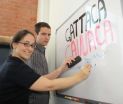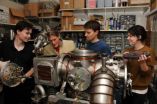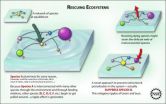(Press-News.org) Charles Darwin based his groundbreaking theory of natural selection on the realization that genetic variation among organisms is the key to evolution.
Some individuals are better adapted to a given environment than others, making them more likely to survive and pass on their genes to future generations. But exactly how nature creates variation in the first place still poses somewhat of a puzzle to evolutionary biologists.
Now, Joanna Masel, associate professor in the UA's department of ecology and evolutionary biology, and postdoctoral fellow Etienne Rajon discovered the ways organisms deal with mistakes that occur while the genetic code in their cells is being interpreted greatly influences their ability to adapt to new environmental conditions – in other words, their ability to evolve.
"Evolution needs a playground in order to try things out," Masel said. "It's like in competitive business: New products and ideas have to be tested to see whether they can live up to the challenge."
The finding is reported in a paper published in the journal Proceedings of the National Academy of Sciences.
In nature, it turns out, many new traits that, for example, enable their bearers to conquer new habitats, start out as blunders: mistakes made by cells that result in altered proteins with changed properties or functions that are new altogether, even when there is nothing wrong with the gene itself. Sometime later, one of these mistakes can get into the gene and become more permanent.
"If the mechanisms interpreting genetic information were completely flawless, organisms would stay the same all the time and be unable to adapt to new situations or changes in their environment," said Masel, who is also a member of the UA's BIO5 Institute.
Living beings face two options of handling the dangers posed by errors, Masel and Rajon wrote. One is to avoid making errors in the first place, for example by having a proofreading mechanism to spot and fix errors as they arise. The authors call this a global solution, since it is not specific to any particular mistake, but instead watches over the entire process.
The alternative is to allow errors to happen, but evolve robustness to the effects of each of them. Masel and Rajon call this strategy a local solution, because in the absence of a global proofreading mechanism, it requires an organism to be resilient to each and every mistake that pops up.
"We discovered that extremely small populations will evolve global solutions, while very large populations will evolve local solutions," Masel said. "Most realistically sized populations can go either direction but will gravitate toward one or the other. But once they do, they rarely switch, even over the course of evolutionary time."
Using what is known about yeast, a popular model organism in basic biological research, Masel and Rajon formulated a mathematical model and ran computer simulations of genetic change in populations.
Avoiding or fixing errors comes at a cost, they pointed out. If it didn't, organisms would have evolved nearly error-free accuracy in translating genetic information into proteins. Instead, there is a trade-off between the cost of keeping proteins free of errors and the risk of allowing potentially deleterious mistakes.
In previous publications, Masel's group introduced the idea of variation within a population producing "hopeful and hopeless monsters" – organisms with genetic changes whose consequences can be either mostly harmless or deadly, but rarely in between.
In the present paper, Masel and Rajon report that natural variation comes in two flavors: regular variation, which is generally bad most of the time, since the odds of a genetic mutation leading to something useful or even better are pretty slim, and what they call cryptic variation, which is less likely to be deadly, and more likely to be mostly harmless.
So how does cryptic variation work and why is it so important for understanding evolution?
By allowing for a certain amount of mistakes to occur instead of quenching them with global proofreading machinery, organisms gain the advantage of allowing for what Masel calls pre-selection: It provides an opportunity for natural selection to act on sequences even before mutations occur.
"There is evidence that cryptic gene sequences still get translated into protein," Masel explained, "at least occasionally."
"When those proteins are bad enough, the sequences that produce them can be selected against. For example, if we imagine a protein with an altered amino acid sequence causing it to not fold correctly and pile up inside the cell, that would be very toxic to the organism."
"In this case of a misfolded protein, selection would favor mutations causing that genetic sequence to not be translated into protein or it would favor sequences in which there is a change so that even if that protein is made by accident, the altered sequence would be harmless."
"Pre-selection puts that cryptic variation in a state of readiness," Masel said. "One could think of local solutions as natural selection going on behind the scenes, weeding out variations that are going to be catastrophic, and enriching others that are only slightly bad or even harmless."
"Whatever is left after this process of pre-selection has to be better," she pointed out. "Therefore, populations relying on this strategy have a greater capability to evolve in response to new challenges. With too much proofreading, that pre-selection can't happen."
"Most populations are fairly well adapted and from an evolutionary perspective get no benefit from lots of variation. Having variation in a cryptic form gets around that because the organism doesn't pay a large cost for it, but it's still there if it needs it."
According to Masel, studying how nature creates innovation holds clues for human society as well.
"We find that biology has a clever solution. It lets lots of ideas flourish, but only in a cryptic form and even while it's cryptic, it weeds out the worst ideas. This is an extremely powerful and successful strategy. I think companies, governments, economics in general can learn a lot on how to foster innovation from understanding how biological innovation works."
INFORMATION:
This study was funded by the National Institutes of Health, or NIH, and through a scholarship awarded to Masel by the Pew Charitable Trusts.
Evolution by mistake
2011-01-26
ELSE PRESS RELEASES FROM THIS DATE:
Physicists take new look at the atom
2011-01-26
Measuring the attractive forces between atoms and surfaces with unprecedented precision, University of Arizona physicists have produced data that could refine our understanding of the structure of atoms and improve nanotechnology. The discovery has been published in the journal Physical Review Letters.
Van der Waals forces are fundamental for chemistry, biology and physics. However, they are among the weakest known chemical interactions, so they are notoriously hard to study. This force is so weak that it is hard to notice in everyday life. But delve into the world of ...
Mathematical model could help predict and prevent future extinctions
2011-01-26
In an effort to better understand the dynamics of complex networks, scientists have developed a mathematical model to describe interactions within ecological food webs. This research, performed by Northwestern University physics professor Adilson Motter and his student, Sagar Sahasrabudhe, is published in the January 25 issue of Nature Communications. The work illustrates how human intervention may effectively aid species conservation efforts.
"Our study provides a theoretical basis for management efforts that would aim to mitigate extinction cascades in food web networks. ...
Aneesoft Corporation Announces the Release of Free Image Editor
2011-01-26
Aneesoft Corporation, a leading digital multimedia software company, announces the release of Aneesoft Free Image Editor today, a free image editing software which fulfills all the basic needs of the average users.
Like a review from Softpedia.com, the second largest download site in Europe, said of Aneesoft Free Image Editor, "Image editing was never simpler". Aneesoft Free Image Editor supports most common image file format, such as .JPG, .PNG, .BMP, .GIF, etc. It provides some basic functions for image editing: crop, rotate, watermark and most attractive of all, various ...
2011 Chelsea International Fine Art Competition
2011-01-26
Agora Gallery is delighted to announce the opening of the Chelsea International Fine Art Competition. This will be the 26th year of the well-known annual competition, which will begin accepting entries on February 2nd, 2011. The submission deadline is March 14th, 2011, and the results will be announced on April 5th, 2011. Details of how to enter can be found here - http://www.agora-gallery.com/competition/default.aspx.
The prizes total a value of $38,000, and include a range of awards, all designed to aid in promoting the careers of the artists whose work will be selected ...
New York City Get's its First NYC Vegetarian Food Festival
2011-01-26
Organizers are hard at work on the first annual New York City Vegetarian Food Festival, which will arrive on Sunday, April 3, in the Chelsea district of Manhattan.
Touted as a celebration and showcase of cruelty-free food, the festival will come complete with speakers, live music, and food contests. Attendees will be able to sample and buy vegetarian food and related lifestyle wares. There will also be information tables for non-profit groups such as Mercy for Animals, which will hand out free literature and vegetarian starter kits to help people connect humane issues ...
K12 Epicure Digital Menu Boards to Meet the New USDA School Nutrition Guidelines
2011-01-26
The newly published USDA School Nutrition Guidelines were on everyone's mind and main topic of interest during the California CSNA School Nutritional Association Annual Conference in Pasadena, CA last week. The Epicure Digital Menu Boards that meet the New USDA School Nutrition Guidelines that featured at the show became a show highlight.
The newly published proposed USDA guidelines would encourage schools to provide at least one additional cup of vegetables daily for students, as well as more fruit, particularly during breakfast. It would require a reduction in sodium ...
myRMX Launches its App at Nokia's Ovi Store
2011-01-26
myRMX releases their app that targets fans of music who like to be creative and show/share that creativity off to their friends.
This release is an updated port to Nokia's S60 V3 phones on Ovi with music by Selena Gomez, Mix Mater Mike, The Asteroids Galaxy Tour, and Grouch & Eligh. As myRMX continues to add artists from around the world, additional mixPACKs will be introduced on both the Nokia and Apple mobile platforms.
With the Nokia launch myRMX adds 200 million additional handsets to its 85 million iPhone and iPod touch target user base. Having a Nokia version ...
Interiors of the Bay Shows Brand New Xtra Bed At The Las Vegas Furniture Market
2011-01-26
Las Vegas -- Interiors of the Bay (http://www.interiorsofthebay.com/), a leading retailer of high quality space saving guest bed solutions, will be featuring their new Xtra Bed at the Las Vegas Furniture Market from January 24 - 28, 2011. The Las Vegas Furniture Market provides furniture retailers throughout the country easy access to more than 1,500 world-class products, manufacturers and resources. The Xtra Bed is just one such amazing new product and the perfect space saving solution for any home.
When: Monday, January 24 - Friday, January 28, 2011
Where: Building ...
Dr. Patty Ann Tublin- Relationship Expert- Gives Tips to De-stress in 2011
2011-01-26
Dr. Patty Ann Tublin, an internationally renowned relationship expert, has just posted a new article on her web site, where she shares three tips on how to de-stress in 2011. The article, "3 Ways to De-Stress Your Life & Your Relationship in 2011," is available at http://www.drpattyann.com/Newsletters/1-14-10.html
Many people toast health and happiness in the New Year, and according to Dr. Patty Ann, one of the best ways to improve your health is to reduce and control your stress.
In the article, she gives three tips to do just that, including communicating your stress ...
Jeremy J. Frederick, M.D. Joins as Exclusive LET'S HAVE A KID Columnist
2011-01-26
LET'S HAVE A KID is thrilled to welcome Dr. Jeremy J. Frederick as our exclusive physician columnist.
Dr. Frederick's premier column, FERTILE GROUND, provides his point of view on LET'S HAVE A KID-related topics including
* Can a hysteroscopy help infertility?
* Should I make money donating eggs?
* How do I know what I'm getting in a sperm donation?
* Why is 35 not "advanced maternal age?"
Dr. Frederick's launch FERTILE GROUND topic, "What is an epidural? Do I need one?" can currently be read on LetsHaveAKid.com. In the coming months, LET'S HAVE A KID members ...


